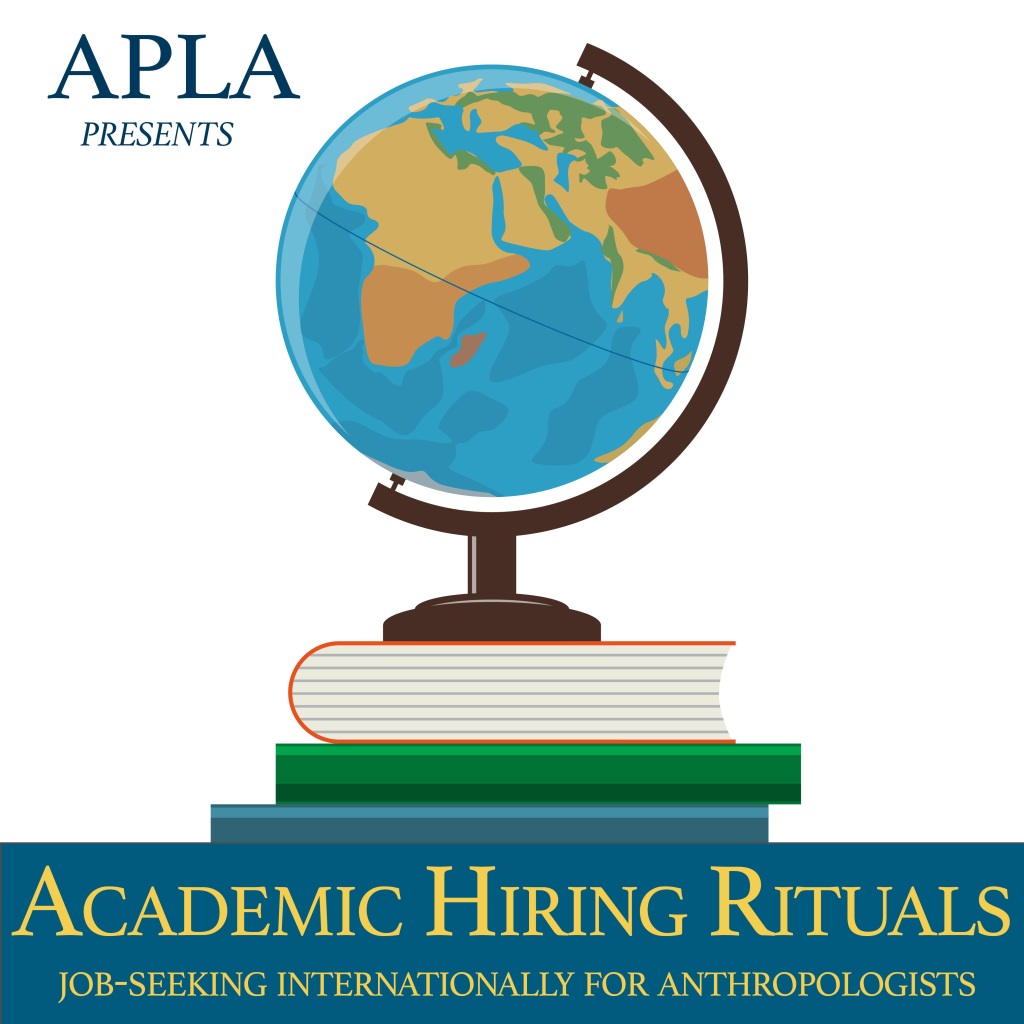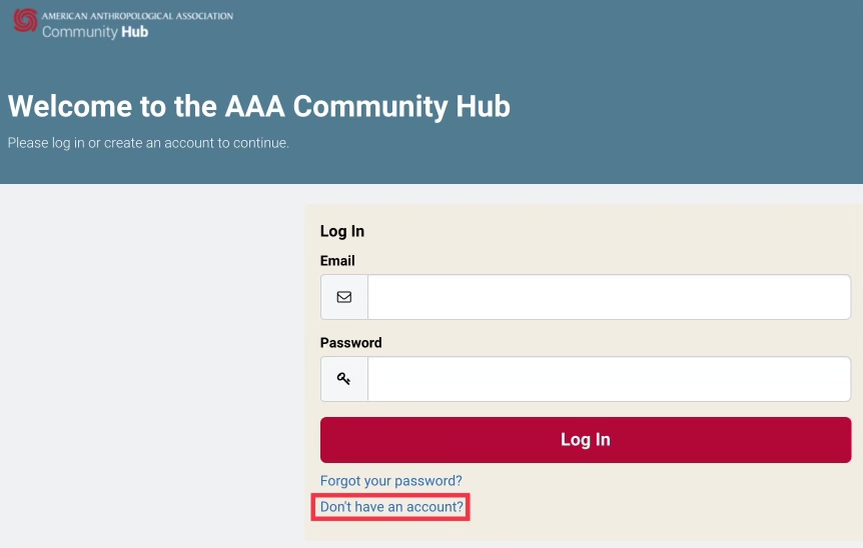Presented by the Association for Political and Legal Anthropology

Our second podcast episode explores how UK anthropology departments hire. Every country has its own traditions of hiring. There are country specific expectations of what genres belong in a job application, and what information matters the most. Different countries’ research funding infrastructure can also strongly shape how applicants are evaluated. In this podcast, we ask academics with considerable experience on hiring committees for an ethnographic account of how the UK hiring ritual unfolds We address questions such as: How are job ads written? How are long lists decided? What and how can an applicant negotiate? The full episode transcript is also available: https://politicalandlegalanthro.org/transcript-for-academic-hiring-rituals-uk-hiring/.
Distributed in collaboration with the American Anthropological Association
UK Hiring Podcast Chapters
You may listen to the full podcast above or on the Apple podcast services. If you only want to listen to specific chapters, you can do so below.
Chapter One: Introduction
Chapter Two: The Job Ad
Chapter Three: The Application
Chapter Four: Determining the Long List
Chapter Five: Compiling the Short List
Chapter Six: Job Talk and Interview
Chapter Seven: The Decision
Chapter Eight: Negotiating the Job Offer
APLA Precariat Fund
We ask people who find listening to the podcast useful to contribute to an APLA fund to help precariat academics with emergency health care and moving costs. The money accumulated in this mutual aid fund will be distributed on a first-come, first-serve basis every summer. We are asking that you help support fellow scholars in need of financial help as they move between non-tenure track jobs, or deal with unexpected health costs. Your donations will help form a mutual aid society moderated by APLA and be greatly appreciated. Directions and a link are below.
Guests
Melissa Demian is head of department of Social Anthropology at the University of St. Andrews. She has worked for over twenty years on the changing nature of social life in Papua New Guinea, focusing variously on colonial history, legal pluralism, customary law, kinship and gender, domestic violence, and urbanization. Her recent book is In Memories of Times to Come: Ironies of History in Southeastern Papua New Guinea.
Mette High directs the Centre for Energy Ethics at St. Andrews. She is also leading a European Research Council funded project: “The Ethics of Oil: Finance Moralities and Environmental Politics in the Global Oil Economy (ENERGY ETHICS)“. Based on multiple ethnographic studies across the world, this 6-year research project involves a 10-person research team and considers how people in the oil economy make financial and ethical valuations of oil. As this project brings an anthropological sensitivity to issues of money, energy and climate change, its ambition is to provide a novel framework for investigating how oil valuations relate to political reforms and new climate economic initiatives. She also is co-Chair for Research on the Environmental Sustainability Board and screening committee member of the St Andrews Prize for the Environment.
Tobias Kelly is a professor of political and legal anthropology at Edinburgh University. He has carried out ethnographic and archival research in Israel/Palestine, the UK and at the UN. He received a PhD in Anthropology from the London School of Economics in 2003, and has worked at the Institute of Law of Birzeit University, the Crisis States Programme at the LSE, and the Centre for Socio-Legal Studies at Oxford University.He is currently leading an ERC Consolidator Grant that looks at the practical and political issues raised by attempts to protect freedom of conscience. More details can be found here. The research examines how claims of conscience are made culturally persuasive, at the meeting point of the apparently religious and secular, the intimate and the public. In doing so, it addresses questions of dissent and the politics of conviction. The wider project involves colleagues working on case studies from the UK, Sri Lanka and the former Soviet Union, as well as work on the role of conscience within the international human rights and humanitarian movement. His particular focus is on the history of claims of conscience in twentieth century Britain, starting with exemption from military service for socialist, anarchists and Christian pacifists, amongst others, and following through to examine the growth of modern human rights and humanitarianism, and the turn to legal claims of conscience by the religious right.
Ruth Mandel teaches in the Department of Anthropology at University College, London. She is a coeditor of Markets and Moralities: Ethnographies of Postsocialism. Since 2017 she has been carrying out ethnographic research on Stolpersteine, a counter-memorial art project marking the final homes of victims of Nazi violence, found throughout Europe http://www.stolpersteine.eu/en/. Between 1994-1999 she spent nearly 3 years in Central Asia, most of the time in Kazakhstan. She researched media and development in Kazakhstan. Afterwards, as part of an international, interdisciplinary research team, she made several research trips to Georgia, studying the situation of IDPs (Internally Displaced Persons) from the several Georgia-Russian conflicts over the past two decades. The project was funded by the Human and Social Dynamics Program at the National Science Foundation (Washington, D.C.).
Cris Shore is currently professor of social anthropology at Goldsmith’s. Prior to returning to the UK he worked for 15 years at the University of Auckland in New Zealand where he was Head of Department and founding Director of the Europe Institute. In 2018 he moved to Sweden to take up a one-year post as Guest Professor in Public Management at the Stockholm Centre for Organisational Research (SCORE) where he researched management and leadership in public organisations. He was founding editor of the journal Anthropology in Action and a founding member and Co-President of the Association for the Anthropology of Policy (ASAP), a Section of the American Anthropological Association (2016-18). With Susan Wright, he is co-editor of the Stanford University Press book series Anthropology of Policy. Cris’s work engages with issues in political anthropology, European ethnography and the study of organisations, particularly the governance and management of universities. His main research interests include power, ideology, the effects of systems of measurement and ranking on individuals and organisations, corruption, and the anthropology of policy. His research covers a range of issues of theoretical and public policy interest including the European Union, the State, elites, corruption, ‘audit culture’ and higher education reform.
Production Staff
This podcast was created by Elisabetta Carosi (sound editor); Jennifer Curtis (editor); Anna Eisenstein (production assistant and narrator); Owen Kohl (assistant editor); and Ilana Gershon (producer).
How to Donate to the Precariat Fund
AAA members, follow this link and login to your AAA account to donate:
https://my.americananthro.org/donatenow?pid=a1B8W00000D0r5HUAR
To ensure the donation is directed to the Precariat Fund, complete the final item on the donation page, “About Your Donation.”
Select the “Tribute Type” toggle menu and select “In Honor Of.” Then enter as the first name: “APLA Precariat” and last name “Fund.”

If you are not a member of AAA, you may also use this link, but rather than logging in, choose the “Don’t have an account?” link below the login button.

You will be directed to a page that asks you to supply your name and email address, and to create a password. Once you have logged in or completed the non-member form, below, you’ll reach the APLA donation page.

